A Healing Hunt

Three combat-wounded U.S. veterans experience memorable Mississippi River waterfowling
Story and photos by Paul Wait
 Bryan Gray stood over his truck’s tailgate, talking as he carefully field dressed the last of the morning ducks he’d shot on the Wisconsin backwaters of the Mississippi River.
Bryan Gray stood over his truck’s tailgate, talking as he carefully field dressed the last of the morning ducks he’d shot on the Wisconsin backwaters of the Mississippi River.
“The first time I was blown up by an I.E.D. (improvised explosive device), I was lucky,” said Gray, a U.S. Army sergeant who served 12½ years and was deployed for combat five times. “The concussion just blew me out of the back of the truck, but I wasn’t hurt.”
Several fellow soldiers weren’t as fortunate. After the attack, U.S. choppers came to the site of the roadside bomb to retrieve the wounded and dead, according to Gray.
“The first chopper was carrying wounded, and I was supposed to be on it,” he recalled. “But I stayed behind to help load up the dead. On the way back, the first chopper was shot down by an RPG (rocket-propelled grenade) and everyone on board died.”
Gray’s words, as he stood calmly cleaning ducks outside of the Duck Inn Lodge in Prairie du Chien, Wisconsin, were startling.
His experiences are unimaginable.
The 42-year-old from Gainesville, Georgia, was shot in 2004 in Afghanistan. However, Gray describes that as a minor event. He healed up quickly and was back on duty for his country. But during a 2006 mission in Iraq, the armored vehicle Gray was riding in hit another I.E.D. This time, he was seriously wounded by shrapnel that tore through the floor and into his flesh. Gray lost his left eye and left thumb. His right hand was permanently damaged, rendering his right thumb unusable.
Choosing to Thrive
Gray is not callous or detached from the horrors of combat. He’s a proud husband and father who has learned to overcome his physical injuries. He’s dealt with the emotional challenges of being a wounded veteran, too.
 “I like to share my story about being injured, and more importantly, how I overcame those injuries,” he said. “I chose to thrive and continue to push forward.”
“I like to share my story about being injured, and more importantly, how I overcame those injuries,” he said. “I chose to thrive and continue to push forward.”
A key part of Gray’s journey includes the Wounded Warriors in Action Foundation, a non-profit organization that serves American combat-wounded Purple Heart recipients by providing outdoor sporting activities to promote healing and wellness.
Gray, who was awarded two Purple Hearts for his combat service, attended a WWIAF event in 2013 as a hero.
“I really love what the Foundation does, and how honest and pure its intentions are to help veterans,” Gray said.
Gray recognized that outdoor experiences such as the hosted hunting and fishing trips WWIAF facilitates help wounded veterans transition from military service back to civilian lives. As a result, he has become a WWIAF associate, essentially a trip leader for three to five outings a year.
“I have found immense satisfaction in being able to serve our heroes,” he said.
Building Friendships
Wisconsin businessman Tim Macht, who has been involved with waterfowl companies, and Matthew Cagle, owner of Rig’Em Right Waterfowl, hosted a WWIAF waterfowl hunt in 2015. Last November, they put on a second hunt with the help of Scott “Scooter” Yeomans and Chico Cjeka, two local duck hunters with extensive knowledge of the Mississippi River.
Gray and two Army combat heroes — Eric Brown and Jonathan Stewart — arrived in camp for three days of duck hunting and adventure.
 Brown, who served as an Army munitions specialist in the Middle East, hails from Wausau, Wisconsin. He joined Cjeka and Cagle in a boat blind hide for the first morning’s hunt. Mallards and gadwalls moved at first light, and before long, circled overhead while hunters hunkered in anticipation.
Brown, who served as an Army munitions specialist in the Middle East, hails from Wausau, Wisconsin. He joined Cjeka and Cagle in a boat blind hide for the first morning’s hunt. Mallards and gadwalls moved at first light, and before long, circled overhead while hunters hunkered in anticipation.
Brown was first to fire, taking aim at a tough-angle greenhead that strafed the hand-carved decoy spread. Soon, a trio of gadwalls swooped low out front. This time, Brown’s barrel caught up to the duck. It dropped it out front, an easy retrieve for Cjeka’s Lab.
Downriver, Gray and Stewart, a former Army munitions specialist from Pulaski, Tennessee, found success while hunting with Yeomans and Macht. The hunters took mallards and a few divers, although the canvasbacks the area is famous for eluded both groups. Camaraderie and friendships were growing, and collectively, the enjoyment of hunting camp began to take over.
Hunting and Fishing
The following morning dawned clear, calm and unseasonably warm, with temperatures in the 50s. In other words, not stellar conditions for waterfowl hunting.
 However, the hero hunters found good fortune when a lone Canada goose decided to rest in the marsh where Yeomans had cradled the duck boat. Stewart and Gray were thrilled to take a bonus honker when it dropped low enough to connect. A short while later, a pair of goldeneyes — seemingly out of place during such a warm day — strafed past.
However, the hero hunters found good fortune when a lone Canada goose decided to rest in the marsh where Yeomans had cradled the duck boat. Stewart and Gray were thrilled to take a bonus honker when it dropped low enough to connect. A short while later, a pair of goldeneyes — seemingly out of place during such a warm day — strafed past.
Gray and Stewart each dropped a bird. It was a proud moment for Gray when he sent his 3-year-old pudelpointer, Tori, to retrieve his first goldeneye. Gray trains dogs year-round, and is involved in the North American Versatile Hunting Dog Association.
In the other duck boat, Brown’s group decoyed a flock of wigeon, and a pair of handsome drakes stayed behind. A couple of gadwalls and a mallard ended up on the hunters’ duck straps, too.
After lunch, the veterans were treated to a unique experience by Mike Valley, a commercial fisherman from Prairie du Chien, Wisconsin. Valley, a self-admitted “river rat,” owns a popular fish and cheese shop in town. He’s a multi-faceted sportsman who carves duck decoys, traps turtles and nets rough fish.
Unsure of exactly what they were getting into, the guys climbed aboard Valley’s wide plate boat for an afternoon as “deck hands” during a fishing run.
 “Look at those crappies!” Stewart exclaimed as he pulled up the first baited hoop net. The veterans quickly sorted the haul, tossing back crappies, bluegills and perch, while putting rough fish — bullheads, sheepshead and suckers — into the harvest bins.
“Look at those crappies!” Stewart exclaimed as he pulled up the first baited hoop net. The veterans quickly sorted the haul, tossing back crappies, bluegills and perch, while putting rough fish — bullheads, sheepshead and suckers — into the harvest bins.
After a string of hoop nets were emptied, Valley piloted toward gill nets he’d set to catch larger fish such as buffalo and carp.
“Keep pulling,” he instructed the veterans as he maneuvered the boat. “Flip that buffalo in. Lift!”
Gray, Stewart and Brown quickly learned the technique, and hundreds of pounds of fish filled the boat.
“This is hard work,” Stewart said through a smile.
At one point, the net had snared a rare paddlefish. It had a metal band through its lower jaw.
“How many of those do you catch?” Gray asked.
“Not many,” Valley said. “They’re protected, so we’ll release it carefully.”
Before he let it go, Stewart hoisted the fish for a picture — a true trophy moment.
Last-Chance Canvasbacks
Normally, canvasbacks regularly infiltrate the backwaters near the Duck Inn Lodge, according to Cjeka. However, after two days of cans being noticeably absent, Yeomans and Cjeka decided the group would venture upriver to hunt on a Mississippi River island. A couple hundred thousand canvasbacks were staged on the river.
 “If the canvasbacks aren’t coming to us, we’ll go to them,” Cagle said.
“If the canvasbacks aren’t coming to us, we’ll go to them,” Cagle said.
Loaded with more than 100 hand-carved canvasback, redhead and ring-necked duck decoys, Cjeka and Yeomans navigated the river in the dark, arriving at a picturesque shallow-water point in front of an island.
Anticipation ran high. None of the veterans had ever shot a canvasback.
“We need some wind,” Yeomans hoped aloud.
As the sun’s rays grew stronger in the east, what would become a massive raft of diving ducks — mostly canvasbacks — started to build a couple hundred yards upriver.
Despite the strikingly realistic spread covering one side of the island, the decoys just couldn’t compete with a flotilla of several thousand live ducks nearby.
“I could lob one out there,” joked Brown, who fired mortar rounds as a soldier.
Just as hope of getting a canvasback began to fade, a pair of the regal ducks zoomed past. Stewart was ready, and folded the drake amongst the decoys.
The second can hooked around the front, offering a long shot for Gray. His gun boomed. The duck faltered, finally coming to rest on the water 100 yards out. Gray handled Tori to fetch the duck, relieved when she had it in her mouth after a long swim.
High-fives, big grins and a sense of accomplishment washed over the island as the pair of handsome canvasbacks came to hand.
Honoring Our Vets
Hunting success is important during WWIAF events, Gray said, but the true mission is to make sure these recovering veterans engage in outdoor activities.
 The goal is to reduce stress and to build friendships with people who can relate to their military service.
The goal is to reduce stress and to build friendships with people who can relate to their military service.
“These trips give veterans a chance to experience the outdoors through world-class activities,” Gray said. “The Foundation offers vets honor, connections and healing.”
Macht, Cagle, Cjeka and Yeomans were humbled to offer a slice of their duck-hunting world to the veterans.
“I’m so appreciative for the service and sacrifices of our military veterans,” Cagle said. “A hunt like this is just a small thing we can do to thank these men for what they’ve done to defend our freedom.”
Paul Wait is editor and publisher of Delta Waterfowl.

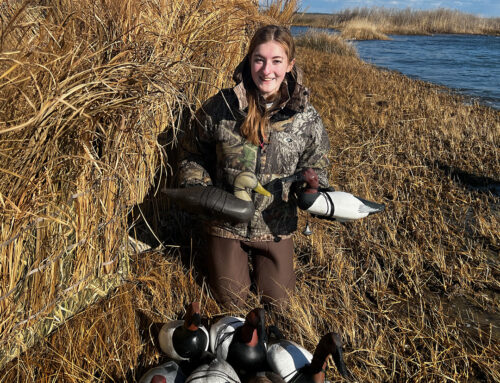
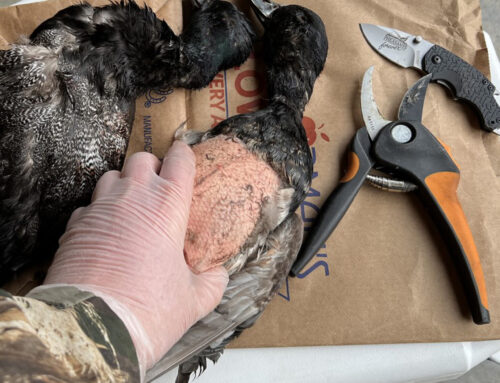
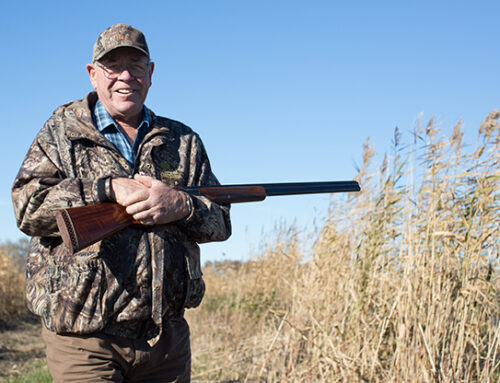
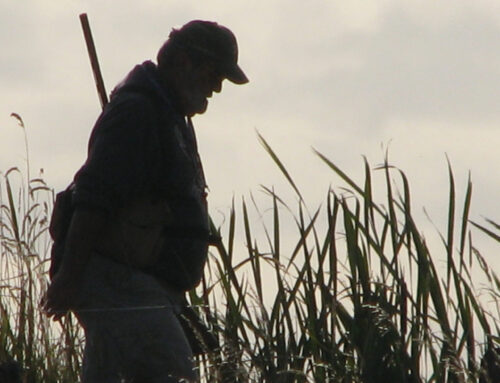
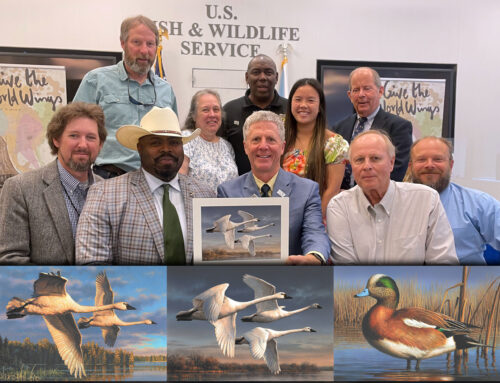
Leave A Comment